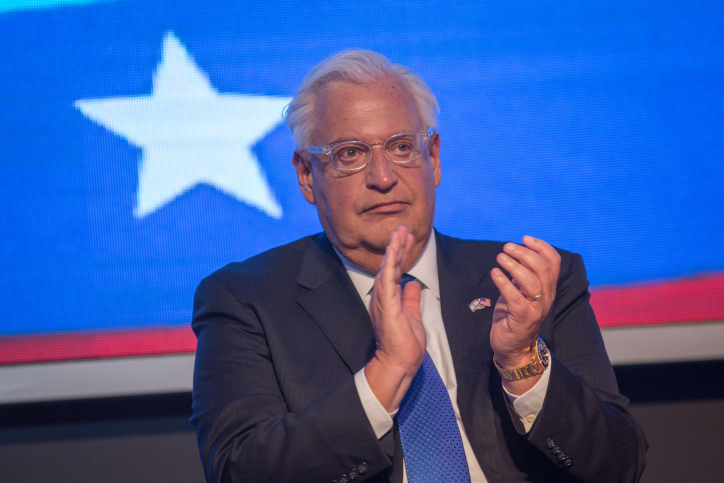With the Bahrain workshop, the Trump administration is relying on the same old Oslo model of economy before politics. What needs to be done is to hold Israel accountable.
By Sam Bahour

After 52 years of Israel’s military occupation of Palestine, there is a fact that cannot be brushed aside: Israel is addicted to the Palestinian economy. This addiction is the product of decades of systematic and forceful actions by the Israeli government to make the Palestinian economy structurally dependent on Israel. Just as with a drug addict or an alcoholic, external intervention is imperative for the sake of the addict and all those within his or her reach; otherwise, the self-inflicted damage will sooner or later be fatal.
After all this time under the boot of Israeli military occupation, enthusiastically supported by the United States every step of the way, Palestinians have a watertight case against participating in yet another workshop with those promising to be their saviors — like the one the Trump administration has called for on June 25 and 26 in Manama, Bahrain.
Anyone who has witnessed the last 25 years of the failure of the U.S.-led peace process knows that what needs to be done, albeit extremely belatedly, is to hold Israel accountable. This would mean using tools like boycotts, divestment, sanctions, diplomatic actions.
The Palestinians are doing their utmost on all these fronts. What’s missing today is for other states to uphold their legal and ethical obligations to do the same. Additionally, this upcoming “economic workshop” is a political moment, and the opportunity of a lifetime, for any country that has not yet formally recognized the State of Palestine to do so immediately, especially if it is truly committed to a two-state solution to this conflict.
How is Israel addicted to the Palestinian economy? Israel reaps $5 billion annually from the captive economy called the occupied Palestinian territory; the Palestinian market is one of Israel’s top export markets after the United States, China and Hong Kong, and the United Kingdom. Israel is addicted to our customs tariffs, skimming a whopping 3 percent off every customs-dollar the Palestinian import-intensive economy generates.
Israel is addicted to our cheap but dedicated and skilled labor — for the benefit of its construction sector and its agricultural sector and its service sector. More recently, Israel expanded this labor addiction to include our knowledge-based professionals. Our military occupier has even taken out newspaper ads promoting a fast-track permit to go to Israel and directly connect our youth with Israeli high-tech firms, bypassing Palestinian firms.
Israel is addicted to our water. It controls the West Bank aquifers, forcing our agricultural sector to decline from 12 percent of our GDP to less than 5 percent. The World Bank has called these Israeli actions “structural damage” that will take generations to repair.
Israel is addicted to our stone and marble quarries, with the Supreme Court of Israel ruling that Israeli occupation authorities can let Israeli firms enter the West Bank and literally steal the land, block by block, for the benefit of Israeli firms.
Israel is addicted to our air space, giving Israeli cellular operators access to the illegal settlements scattered across the West Bank mountaintops. These companies erect their infrastructure and gain access to our electromagnetic spectrum, so that they can provide telecommunication services to the Palestinian territory — without being licensed, without taxation, and without environmental oversight.
Israel is addicted to using the Gaza Strip as a laboratory where Israeli weapons and security-product manufacturers can freely test their wares with total impunity.
The list is long, but the addiction is clear and has been overwhelmingly documented by every country engaged in the conflict, particularly the United States, the United Kingdom, and the European Union, as well as the World Bank, the International Monetary Fund (IMF), and the United Nations Conference on Trade and Development (UNCTAD), among others.
After being on the receiving end of this Israeli addiction for decades, especially those of us in the Palestinian private sector, we are now being told by a U.S. bankruptcy lawyer, a New York real estate lawyer, and a questionable U.S. real estate developer that the Palestinian economy should be advanced before political parameters are defined.

Is the U.S. Administration blind to the fact that we already tried that, for 25 years? It was called the Oslo Peace Process, and it was monopolized by the United States. It was a process that witnessed our geography being physically fragmented beyond recognition. It was a process that allowed the erection of a wall, higher and longer than the Berlin Wall, which separates Palestinians from Palestinians. It was a process that accelerated the blatantly illegal Israeli settlement enterprise from 100,000 to more than 600,000 settlers in the West Bank. It was a process that resulted in more Palestinians’ being imprisoned, many of them minors. It was a process that witnessed more Palestinian homes being destroyed, in all parts of the occupied territory.
Need I go on to explain why another U.S.-driven process using the same old Oslo model — economy before politics — is unacceptable to Palestinians?
After all the damage done by the very political actions already taken by the Trump administration, is it really necessary to hold a “workshop” in a third country, without the Palestinians and possibly without our military occupier?
Will Bahrain convince the Israelis to give us access to our natural gas wells in the sea of Gaza that have been blocked since 1999? Will Saudi Arabia compensate us for all the financial damage done to our economy from the Israeli pillaging of our resources for the past 52 years? Will the United Arab Emirates convince Israel to implement what Israel signed on to in Oslo, which are four safe passageways between the West Bank and the Gaza Strip? Do Kushner and company actually believe that a few Palestinian Uncle Toms will be able to absorb the $60-80 billion in investments they say they are aiming to raise at this workshop?
The answers are clear.
Israel is driving drunk on power, and it is about to fall off the cliff. The cliff has a name; it’s called the two-state solution. Israel’s only friend who can tell it to stop driving drunk is the U.S., but instead of stopping the car, U.S. Ambassador David Friedman jumped into the driver’s seat and is pressing the gas pedal with all his might. He and the United States will be the only ones to blame for the failure of next week’s workshop and the infamous “Ordeal of the Century.”
Sam Bahour is a Palestinian-American business consultant from Ramallah/Al-Bireh in the West Bank. He is chair of the board of Americans for a Vibrant Palestinian Economy (AVPE) and serves as a policy adviser to Al-Shabaka, the Palestinian Policy Network and is co-editor of “Homeland: Oral Histories of Palestine and Palestinians” (1994). He blogs at ePalestine.com. @SamBahour
